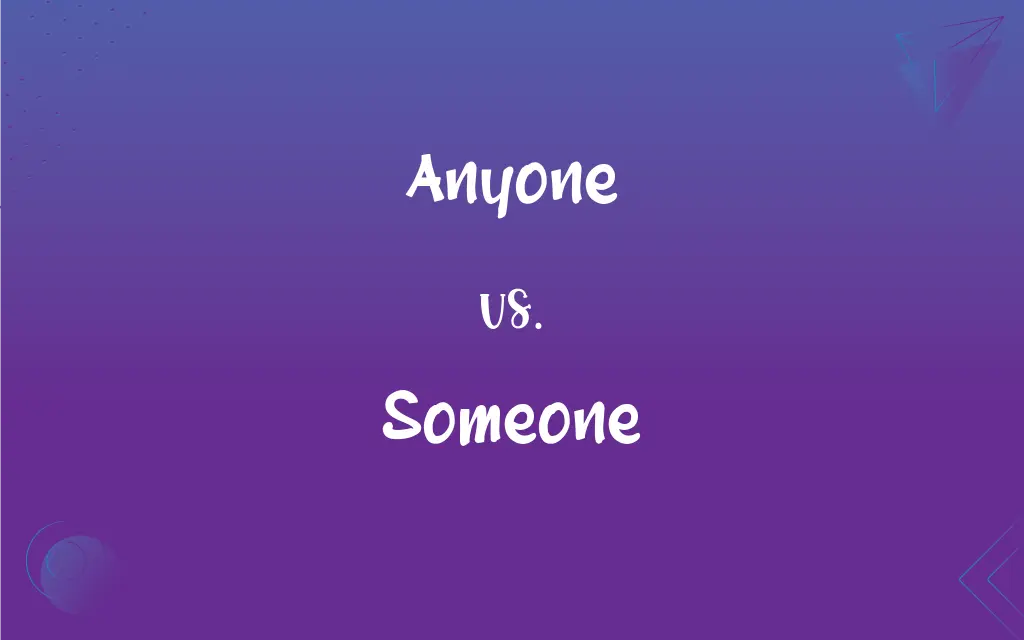Anyone vs. Someone: What's the Difference?
Edited by Harlon Moss || By Janet White || Updated on November 29, 2023
Anyone refers to any person or people, without restriction; someone refers to an unspecified person, often implying a specific but unidentified individual.

Key Differences
Anyone is used to refer to any person at all, without specifying who, and is often used in questions and negative statements. Someone, however, implies a certain unspecified individual, used when the identity is unknown or not important to the context.
In usage, 'anyone' suggests no limitation in choice, representing an open, indefinite group. 'Someone' suggests a more specific, albeit unidentified, individual within a context or situation.
'Anyone' is often used in contexts where the identity of the person is not relevant, emphasizing the inclusivity of the statement. 'Someone', on the other hand, is used when the identity matters to some extent but remains unknown or is being kept anonymous.
In questions, 'anyone' can imply a broader search for volunteers or participants, while 'someone' implies a need for a particular kind of person. For example, asking "Can anyone help?" vs. "Can someone help with the technical issue?".
'Anyone' is inclusive and general, suitable for referring to people in the broadest sense. 'Someone', while still indefinite, carries a more personal or specific connotation, hinting at a particular kind of person.
ADVERTISEMENT
Comparison Chart
Definition
Any person, without restriction.
An unspecified, specific individual.
Connotation
Inclusive and general.
Specific but unidentified.
Usage in Questions
Broad, seeking any volunteer.
Seeking a particular kind of person.
Implication
No limitation in choice.
Some degree of specificity or personal relevance.
Contextual Suitability
Used where identity is not relevant.
Used when identity is somewhat relevant.
ADVERTISEMENT
Anyone and Someone Definitions
Anyone
Any person at all.
Anyone can join the club, regardless of their skill level.
Someone
Used to refer to a person of importance or relevance in a context.
There must be someone who knows how to fix this.
Anyone
Used in questions to ask about any person.
Does anyone know the answer to this problem?
Someone
A person of unspecified identity.
I heard someone singing in the next room.
Anyone
Used in negative statements to denote no person.
Anyone can see that this is a bad idea.
Someone
Referring to a person in a particular role or situation.
We need someone with expertise in marketing for the project.
Anyone
Referring to people in general.
Anyone would be upset in this situation.
Someone
An unknown individual.
Someone called you earlier but didn't leave a name.
Anyone
Indicating an open choice among people.
Anyone interested in the job should apply.
Someone
An unspecified person.
Someone left their umbrella in the office.
Anyone
Any person; anybody.
Almost anyone can change a light bulb.
Someone
A person of importance
He really thinks he's someone.
Anyone
One taken at random rather than by selection; anybody. [Commonly written as two words.]
Someone
Some person.
Can someone help me, please?
Someone
A partially specified but unnamed person.
Do you need a gift for that special someone?
Someone
An important person
He thinks he has become someone.
Someone
A human being;
There was too much for one person to do
FAQs
What does anyone mean?
Anyone refers to any person or people, without specific identity.
When is anyone used?
Anyone is used when referring to people in general, with no restriction.
What does someone mean?
Someone refers to an unspecified but specific individual.
When should you use someone?
Use someone when referring to an unknown but specific person.
Is anyone suitable for formal contexts?
Yes, it is suitable for both formal and informal contexts.
Is someone used in formal writing?
Yes, it is appropriate in both formal and informal contexts.
How does anyone function in a sentence?
It acts as a pronoun referring to any person or people.
Can someone be plural?
No, it usually refers to a single, unspecified individual.
Can anyone be used for a specific person?
No, it refers to any person, not a specific individual.
What is the role of someone in a sentence?
It serves as a pronoun for an unspecified individual.
What is the key difference in their usage?
Anyone is more general, someone is more specific.
Is someone suitable for indefinite references?
Yes, when referring to an unspecified but particular individual.
Can the use of anyone or someone change the meaning of a sentence?
Yes, it can change the specificity and focus of the reference.
How do these words affect the tone of a sentence?
Anyone can make a statement more inclusive, someone more exclusive.
Are there any synonyms for anyone and someone?
Synonyms include anybody for anyone, and somebody for someone.
Can someone refer to a known person?
It typically refers to an unknown or unspecified individual.
Can anyone and someone be used interchangeably?
Not always, as they have different connotations.
Is anyone always plural in meaning?
It can refer to any number of people, including just one.
How does context affect their usage?
The choice depends on whether a general or specific reference is needed.
Can anyone be used in a negative sentence?
Yes, it's often used to denote 'no person' in negatives.
About Author
Written by
Janet WhiteJanet White has been an esteemed writer and blogger for Difference Wiki. Holding a Master's degree in Science and Medical Journalism from the prestigious Boston University, she has consistently demonstrated her expertise and passion for her field. When she's not immersed in her work, Janet relishes her time exercising, delving into a good book, and cherishing moments with friends and family.
Edited by
Harlon MossHarlon is a seasoned quality moderator and accomplished content writer for Difference Wiki. An alumnus of the prestigious University of California, he earned his degree in Computer Science. Leveraging his academic background, Harlon brings a meticulous and informed perspective to his work, ensuring content accuracy and excellence.































































